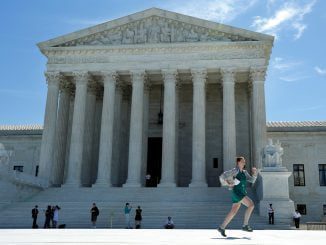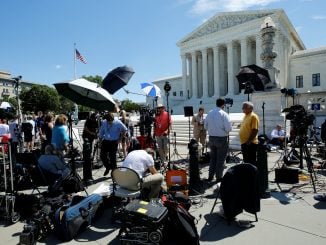
HARTFORD, Conn. — The U.S. Supreme Court on Monday declined to hear the appeals of several former pro wrestlers who claimed in lawsuits that World Wrestling Entertainment failed to protect them from repeated head injuries that led to long-term brain damage.
The former wrestlers asked the high court to review lower court rulings that dismissed the lawsuits because they were filed too late. The plaintiffs include William “Billy Jack” Haynes, Russ “Big Russ” McCullough, Ryan Sakoda, Matthew “Luther Reigns” Wiese and the wife of the late Nelson “Viscera” Frazier, also known as Big Daddy V, who died in 2014.
Monday’s decision, which the Supreme Court did not explain under its usual practice, put an end to the last remaining lawsuits in an array of litigation originally filed six years ago in Connecticut against the WWE over concussions and other injuries. The WWE is based in Stamford.
More than 50 former wrestlers, most of them stars in the 1980s and 1990s, sued the WWE, saying they suffered repeated head injuries including concussions that led to long-term brain damage. They accused the WWE of knowing of the risks of head injuries but not warning its wrestlers.
Other wrestlers who filed suit were Jimmy “Superfly” Snuka, Joseph “Road Warrior Animal” Laurinaitis, Paul “Mr. Wonderful” Orndorff, Chris “King Kong Bundy” Pallies and Harry Masayoshi Fujiwara, known as Mr. Fuji.
Snuka and Fujiwara died in 2017 and 2016, respectively, and were diagnosed with chronic traumatic encephalopathy, or CTE, after their deaths, according to their lawyer. Pallies and Laurinaitis died in 2019 and 2020, respectively, of undisclosed causes. Other plaintiffs have dementia and other illnesses, the lawsuits said.
Several lawsuits were dismissed in 2018 by U.S. District Judge Vanessa Bryant in Hartford, Connecticut. Bryant ruled there was no evidence the WWE knew while the plaintiffs were wrestling that concussions or head blows during matches caused CTE or other long-term injuries.
She also ruled the lawsuits that were the subject of Monday’s Supreme Court decision were filed after the statute of limitations expired.
The rulings were upheld last year by a federal appeals court in New York City.
The WWE denied wrongdoing and said the lawsuits had no merit.
“We’re glad its finally over,” Jerry McDevitt, a lawyer for the WWE, said Monday. “We were completely vindicated.”
A message seeking comment was left Monday for the wrestlers’ lawyer, Konstantine Kyros, based in Hingham, Massachusetts.
Kyros had criticized Bryant’s rulings and said the former wrestlers had been “deprived of their fundamental rights as U.S. Citizens, including their right to appeal.”
Kyros said the 2nd U.S. Circuit Court of Appeals in Manhattan rejected earlier appeals because final rulings had not been made in all the lawsuits. After Bryant made those final rulings in 2018, Kyros refiled appeals in several of the lawsuits that went to the Supreme Court. But he said the 2nd Circuit rejected those appeals, saying they were filed too late according to a new precedent set by the Supreme Court.
In her 2018 ruling, Bryant also criticized Kyros for repeatedly failing to comply with court rules and orders and ordered him to pay WWE’s legal fees — more than $500,000.



